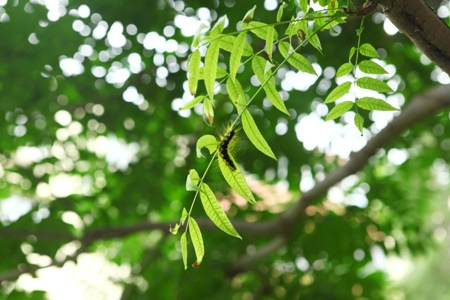
A caterpillar, identified as that of a domestic tiger moth by experts. (Photos: Global Times)
Alien moth caterpillars have infested a Tongzhou district housing compound, claimed residents, who complained that authorities have done nothing to help after the pests attacked the compound's trees.
However, an entomologist in Beijing has said it is much more likely that the pests are homegrown rather than American white moth caterpillars, after the Global Times sent pictures to experts for identification.
A female resident of Jixiangyuan in Tongzhou, posted online that her compound had been overwhelmed with the caterpillars of the American white moth on Monday.
Alongside photos, she called for help with the pests that had already stripped the leaves off one tree, and were spreading to others.
"We checked it online and it seemed like an American white moth to me," said the Web user, who declined to be named, via instant message.
When the Global Times arrived there, corpses of the pests were found scattered on the ground, direct evidence of the residents' enthusiastic efforts to kill them.
Local residents were keen to point out the offending caterpillars under the Cedrela tree that had been devastated. The caterpillars are around 2 to 3 centimeters long and 5 millimeters wide, with tough yellow hairs all over their bodies.
"The tree was still full of leaves about a week ago when the pests were originally found here, but now it's leafless," said Wang Chonghui, a local resident.
"We don't know what pest it is but it's the first time we saw it here," she said.
The American white moth, which is indigenous to North America, was first detected in China in Liaoning Province in 1979. While it may not be so dangerous for garden trees and plants, it can have devastating effects on crops and orchards, and Chinese agricultural authorities take the threat seriously.
A plague of the insects can destroy more than 300 plants and consume the leaves of two hectares of poplars within two days, reported the Xinhua News Agency in April 2010. Shandong Province alone had trained 8 million residents to battle the moth and its caterpillars, and infestations must be reported within 48 hours, the report said.
For the last five years, China has released millions of bees, a natural predator, in an attempt to combat the alien moth menace, said another Xinhua report in August 2011.
Although Wang and other residents tried to inform their local committee when the pests were found a week ago, nothing has been done so far.
Li Qingtao, another resident, said that although the residents sprinkled pesticide on the trees, this has had little effect.
"This year is the most severe [infestation] since I moved here 15 years ago. The officials should take more action before it's too late," Li said.
But Yu Guoyue, the director of Beijing Association of Insects, refuted the residents' claims that the moth caterpillars are illegal aliens, after he saw the photos from the compound.
"The American white moth has been under control in Beijing, especially after 2008," he said. Beijing made extra pest control efforts in the run up to that year's Olympic Games, he said.
"However, these caterpillars are not that of the American moth but the domestic tiger moth," Yu said.
Tiger moths are not dangerous to humans, Yu said, although they are a danger for trees, particularly at this active period of the year.
"Since there are hundreds of insects in Beijing there is no way we could keep our eyes on every single compound [about possible infection]," said an anonymous employee from Beijing Forestry Bureau. He made this comment after knowing the Tongzhou compound might be affected by the American white moth.
Wang Wenbao, director of the sanitation department of Xinhua Street Community where the compound is located, said that the compound was sprayed Tuesday morning, but only at the edges.
"It's not convenient to spray pesticide in the compound because of the clothes hung up there," he said, but promised the trees would be disinfected tomorrow to ease residents' concerns.

Copyright ©1999-2011 Chinanews.com. All rights reserved.
Reproduction in whole or in part without permission is prohibited.